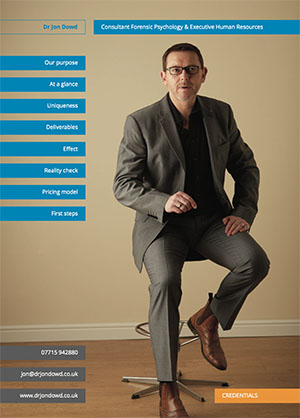The Risk Within
Monday, March 07, 2016

City Traders and Stockbrokers are expected to foresee, account for and protect against financial risk.
The value of client portfolios depends on it.
In a volatile environment where individual trades can result in extreme gains one day, and extreme losses the next; the client must implicitly trust the skills of the Trader.
There are clear risks of course, which every client understands.
But when the Trader becomes the risk, what can the client do to protect their own interests?
• Leeson 1995
• Hamanaka 1998
• Rusnak 2002
• Kerviel 2006
• Adoboli 2011
The list of Rogue Traders, risking and losing billions, continues to grow.
The companies they worked for are all examples of smart, well established financial institutions and HNWI, brought to ruin by the actions of one individual entrusted with the immense responsibility to act in the best interests of their clients.
With hindsight, clients can often see that the character traits for the Trader’s deception and risk-taking were there all along. But this is little consolation after the fact.
For total protection, the Trader must be fully assessed before the event; not after.
Human Behaviour
Human behaviour is influenced by our psychological make up and our inherent mental hardwiring. This psychological ‘framework’ is established at conception and then morphs in response to numerous stimuli - understanding what influences behavioural decision-making is the key. It’s a simple fact that some people are predisposed to choose a path of risk and exploit for their own gain and personal prowess.
So, when it comes to Traders making risky decisions, it’s not the opportunity in front of them that’s the deciding factor… it’s their inherent psychological framework. With almost 100% certainty - they are an accident waiting to happen.
• Impulsive nature
• Attention seeking
• Inflated ego
• Self-gratification
All of these psychological character traits, by definition, can only to be satisfied at the expense of consideration of consequences and fallout.
In small, controlled doses, these traits may actually be helpful to the Trader - instilling the confidence to act quickly under pressure - but, unchecked, these traits bring down global organisations.
The psychological characters traits above are one step away from exploitative, self-enhancing, self-glorifying, grandiose, undisciplined arrogance. Give a person like this the power to make life-changing financial decisions, and they’re likely to surrender to temptation… especially if the practical risk isn’t theirs.
Look further. Protect further
Forensic Psychologists view people like Leeson, Hamanaka, Rusnak, Kerviel and Adoboli with knowing insight.
Could we have predicted their exact risk-taking behaviour?
Possibly.
Could we have predicted the likelihood of their risk-taking behaviour?
Absolutely.
Employing a Rogue Trader is not bad luck. It’s bad assessment.
The insight is there for you to use.
Our expertise is there for you to use.








0 comments